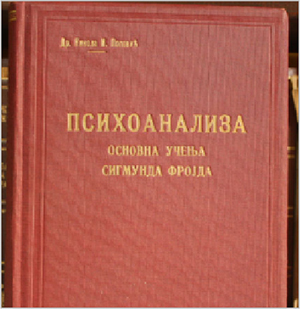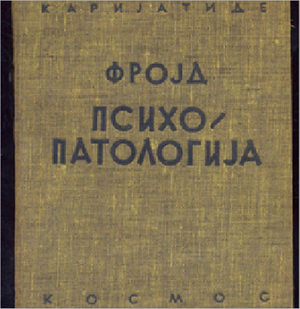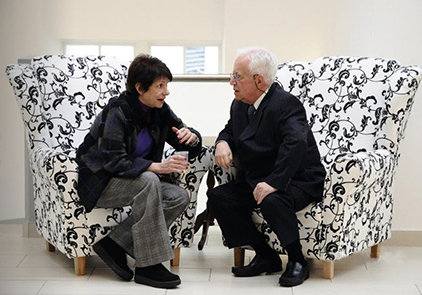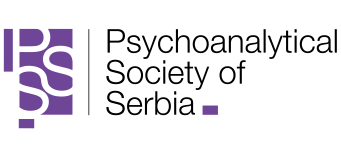ABOUT US
The Psychoanalytical Society of Serbia (PSS) draws upon a vibrant, one-hundred-year-old tradition of psychoanalytical thought in this region. Its members have been the driving force behind a twenty-year-long development of psychoanalysis in our country.
High educational potential (seven training analysts), continual professional exchange and advanced training, international network, rich experience in organization and execution of professional gatherings, cooperation and enthusiasm of its members – are the foundations which enable the Society to grow and develop.
The Psychoanalytical Society of Serbia – PSS is a member of the International Psychoanalytical Association – IPA www.ipa.world, with the status of IPA Component Society.
PSS MEMBERS
Olivera Aleksić-Hil, psychoanalyst
Vesna Brzev Ćurčić, training psychoanalyst
Vojislav Ćurčić, training psychoanalyst
Nataša Đerković – Lukač, psychoanalyst
Dejan Florikić, psychoanalyst
Danijela Galović, psychoanalyst
Aleksandar Kontić, psychoanalyst
Marija Marjanović, psychoanalyst
Milica Martinović, psychoanalyst
Tijana Miladinović, training psychoanalyst
Ljiljana Milivojević, training psychoanalyst
Jovana Mladenović, psychoanalyst
Nina Popadić, training psychoanalyst
Olga Savostjanova, psychoanalyst
Sandra Simić, training psychoanalyst
Jasminka Šuljagić, training psychoanalyst
Jelica Tešić, psychoanalyst
Marija Vezmar, training psychoanalyst
Oliver Vidojević, psychoanalyst
Jasmina Vrbaški, psychoanalyst
Anka Marjanović Radonjić, psychoanalyst
Ivana Dobrić, psychoanalyst
Srđa Zlopaša, psychoanalyst
PSS PSYCHOANALYSTS IN TRANING
Ana Radovanović, anaradovanovic.bg@gmail.com
Anđelković Lemez Zona, zonna_84@hotmail.com
Arežina Leontina, a.leontina3@gmail.com
Bacigalupo Jovana, jovana.vukovic84@yahoo.com
Bulatović Miloš, bulatmilos@gmail.com
Rajković Katarina, katarinadodic@hotmail.com
Dubljević Dušica, dusicca@yahoo.com
Đurić Danilo, djuricdanilo@yahoo.com
Gvozdić Ana, gvozdic.ana@gmail.com
Erić Emilija, emilijaeric@yahoo.com
Jokić Darja, darjazivkovic@gmail.com
Krdžić Tamara, tamarakrneta011@gmail.com
Menzalin Andrea, amazing-kubik@yandex.ru
Mijaljica Goran, mijaljica@gmail.com
Mijalčić Mina, mina.godjevac@gmail.com
Moreno Maja, maja.moreno@gmail.com
Tomanić Milena, milena.tomanic@yahoo.com
Vezmar Milica, mvezmar88@gmail.com
Vidojković Jelena, nedeljkovicje@yahoo.com
Vidić Jelena, vidic.jelena@gmail.com
Martinović Milena, maliprinc321@yahoo.com
Savić Bojana, bbojana82@yahoo.com
Savić Jovanović Ivana, ivanuk27@gmail.com
Šešlija Ksenija, ksenijases@gmail.com
Valkanou Maša, mkvalkanou@gmail.com
PSS ORGANIZATION
Executive Board:
President – Tijana Miladinović
General Secretary: Nina Popadić
Treasurer – Nataša Đerković
Chair of Training Committee – Vesna Brzev Ćurčić
Officer for Scientific Activities Professional Activities Secretary – Olga Savostjanova
Officer for Outreach Secretary for Promotion of Psychoanalysis – Jovana Mladenović
Training Committee:
Vesna Brzev Ćurčić, Chair of TC
Marija Vezmar
Jasminka Šuljagić
Ethics Committee:
Ljiljana Milivojević, Ethics Committee Secretary
Oliver Vidojević
Jasmina Vrbaški
HISTORY OF PSYCHOANALYSIS IN SERBIA
THE BEGINNINGS: PSYCHOANALYSIS IN SERBIA BETWEEN WORLD WARS
The Psychoanalytical Society in Belgrade was established in 1938, on the foundations of the Yugoslav Society for Mental Hygiene. It was founded by foreign-educated Belgrade psychoanalysts, after the launch of the Society of Yugoslav Psychiatrists in 1932 and the Yugoslav Society for Mental Hygiene.
The initiator and leader of the group was Nikola Mikloš Šugar (1897-1945), an analyst of the Psychoanalytical Societies of Hungary and Vienna, originally from Subotica.
This Psychoanalytical Society was independent from any scientific or professional institution. Although it was only active for less than four years, due to the start of the WWII among other reasons, it greatly contributed to the expansion of psychoanalysis in this region. Books by significant psychoanalytic authors, Sigmund Freud in the first place, were translated, lectures were given for general audience, and original works by Serbian contemporaries were published.

Psychoanalysis - Main Teachings by Sigmund Freud. Nikola M. Popović. Publisher: Geca Kon, Belgrade, 1935

INTRODUCTION TO PSYCHOANALYSIS - SIGMUND FREUD 1933. Translated by Dr. Borislav Lorenc. Published by: KOSMOS, BELGRADE

Psychopathology of Everyday Life S. Freud, KOSMOS - Belgrade – Karijatide, 1937
Since the interest for both theory and practice of psychoanalysis existed in our country, Šugar gained students from the pool of contemporary psychiatrists who began their own personal psychoanalyses with him. From Nikola Šugar’s student circle, there were four who distinguished themselves: Hugo Klajn, Nikola Popović, Vladislav Klajn and Vojin Matić. Of these four students of Nikola Šugar, only Vojin Matić continued the work on the spread ofpsychoanalysis by accepting into personal analysis young colleagues interested in the development of this trend. The others were engaged in the development of theoretical thought as well as in psychoanalytic psychotherapy. The education in psychoanalysis lasted until 1941. Nikola Šugar died in a concentration camp close to the end of WWII.
PSYCHOANALYSIS IN SERBIA 1950-2000
After WWII, in 1953, in Belgrade, Vojin Matić (1911-2000), founded the Medical-Pedagogical Counseling Center, a psychotherapy center for the treatment of children based on a psychoanalytic foundation. The founding of the Counseling Center, as a nursery of professionals, some of which would go on to become recognized psychoanalysts in IPA (International Psychoanalytical Association), presented a great step in the development of psychoanalysis in Serbia.

Vojin Matić (1911 – 2000) (1911 – 2000.)

From left to right: Katarina Radovanović, psychologist; Milica Miljković, speech pathologist; Ksenija Kondić, psychologist, later on Professor at the School of Philosophy, she took over Psychopathology of Childhood and Adolescence from Matić; Professor Vojin Matić, Dr. Slavka Brzev-Mančić, psychiatrist; Stanko Ivandić, psychologist.
Two psychiatric institutions in Belgrade continued to spread the psychoanalytic thought: the Institute for Mental Health and Hospital for Psychiatry of the University Hospital Center “Dr. DragišaMišović-Dedinje,” where the first department for (psychoanalytic) psychotherapy in the region of Former Yugoslavia was founded.
In the mid ’80s of the 20th century, owing to the enthusiasm of Tamara Štajner-Popović, Belgrade psychoanalysts managed to connect with the world. The Belgrade Society for Development of Psychoanalysis was established in 1990, and in November of the same year, in cooperation with the International Psychoanalytical Association (IPA), it organized the East European Psychoanalytic Seminar.

Tamara Štajner-Popović (1948 – 2012)

The Founding Assembly of the Belgrade Society for Development of Psychoanalysis in 1990, (from left to right): Milica Jojić-Milenković, LjiljanaMilosavljević, Vojin Matić, Tamara Štajner-Popović, Vladimir Petrović, Katarina Radovanović, KsenijaKondić, Vojislav Ćurčić
Six professionals from Belgrade were evaluated in 1995 by five IPA training psychoanalysts, IPA members, from different countries and they all gained the status of direct International Psychoanalytical Association (IPA) members by the equivalence procedure, which made the forming of the Belgrade Psychoanalytical Study Group possible.
That same year, at the Congress in San Francisco, Professor Matić received a well-deserved recognition from the International Psychoanalytical Association for the development of psychoanalysis in this region.
In 1996, the Belgrade Psychoanalytical Study Group became a member of the International Psychoanalytical Association (IPA) and the European Psychoanalytical Federation (EPF).
Tamara Štajner-Popović became the first training analyst and the first child analyst of the newlyfounded Belgrade Study Group within the International Psychoanalytical Association. Milica Jojić Milenković (1928-2008) and Ljiljana Milosavljević (1928-2014), the first generation of Matić’s students, were declared senior analysts by the Sponsoring Committee.
A significant assistance in founding and development of the Belgrade Psychoanalytical Study Group was provided by the world-renowned analysts, members of the Sponsoring and Liaison Committees: Han Groen-Prakken (Netherlands), John Kafka (USA), Alex Mozer (Switzerland), Daniel Widlôcher (France), Brendan MacCarthy (England), Betty Denzler (Switzerland), Abigail Golomb (Israel), and Gabor Szőnyi (Hungary).
PSYCHOANALYSIS IN SERBIA AFTER 2000
In March 2003, the Belgrade Psychoanalytical Study Group gained a new status and became the Belgrade Psychoanalytical Provisional (Interim) Society.
At the 45th Congress of the International Psychoanalytical Association, held in Berlin on July 27, 2007, the Belgrade Psychoanalytical Society gained the status of IPA Component (Full) Society. A several decades-long enthusiastic and professional effort of multiple generations of psychoanalysts was recognized as a professional qualification for the status of an equal member.
Until 2010, numerous psychoanalytic conferences, workshops, and international happenings were organized, where all members as well as candidates of the Belgrade Psychoanalytical Society participated. Our guests were John Kafka, Clauido Eizerik, Daniel Widlocher, Stefano Bolognini, Jonathan Sklar, Marilia Aisenstein, Gábor Szőnyi, Paolo Fonda, Kitty Schmidt, Abigail Golomb, Michel Vincent and many others. The following events were organized in cooperation with the European Psychoanalytical Federation: EPF Council Meeting, 2005, Belgrade; EPF Associate Member Seminar, 2006, Babe, Serbia; EPF Training Forum, 2007, Belgrade.
However, from 2010 to 2014, due to rough and numerous attacks by some of our members aimed at our most eminent members, primarily Tamara Štajner-Popović, the Society entered a period of work paralysis.
Despite the efforts of the Society members, the Committee and the representatives from the International Psychoanalytical Association, the problem proved impossible to overcome – it became obvious that the members of the Belgrade Psychoanalytical Society did not share the same human and professional values and that a joint opinion on the perspective and acceptable solutions for the future of psychoanalysis in Serbia did not exist.
Accordingly, and after both long and serious consideration, the decision was made to found the Psychoanalytical Society of Serbia.
In May 2014, the majority – 16 members of the Belgrade Psychoanalytical Society, among them six training analysts as well as all members of the BPS Executive Board, Training Committee and Ethics Committee, twice legally elected in the elections at the Assembly in October 2011 and April 2012, became the founders of the Psychoanalytical Society of Serbia.
In October of the same year, the Psychoanalytical Society of Serbia became a member of the International Psychoanalytical Association – IPA, with the Interim Provisional Society Status.
During the IPA Congress in Boston, at the Business Meeting on July 23, 2015, the Psychoanalytical Society of Serbia, by a unanimous decision, received a confirmation of the status of a Provisional Society approved by the IPA Board in September 2014.
During the IPA Congress in Buenos Aires, at the Business Meeting on July 27, 2017, the Psychoanalytical Society of Serbia was awarded the status of a Component Society

Tamara Štajner-Popović, always committed to supporting psychoanalytical institutions in the region and around the world,
in a conversation with Eduard Klain, a key figure for the development of psychoanalysis in Croatia
TAMARA ŠTAJNER-POPOVIĆ
Tamara Štajner-Popović (1948-2012), the first training analyst and child analyst in Serbia, holds a special place in the history of the Psychoanalytical Society of Serbia. “Tamara was the soul of the beginning of the modern development of psychoanalysis in Belgrade” (Paolo Fonda, International New Groups (ING), Co-Chair). The Belgrade Study Group, which, primarily thanks to her, became a full member of the International Psychoanalytical Association, was her brainchild, and she served as its first President. During the bombing in 1999, her appeal for financial solidarity and support for Belgrade colleagues was met with positive responses by many European psychoanalytical societies; this is how psychoanalysis survived those difficult years. Her efforts for recognition of psychoanalysis as a theory and therapeutic technique led to the recognition of Serbia and former East European countries as new cradles of the old psychoanalysis. In the Belgrade Psychoanalytical Society, as a Co-Chair of ING for Europe, as an Associate Director for the Teaching Outreach Section PIEE, she organized more than 25 schools and always fought for professionalism, knowledge, ethics, and the presence of psychoanalysis in the European east as well.
At the IPA Congress in Prague in 2013, an Homage for Tamara, where the most eminent world analysts gave their speeches, was held at the IPA Congress in Prague in 2013.

Stefano Bolognini, Paolo Fonda, Jonathan Sklar at the IPA Congress in Prague in 2013 talk about
Tamara Štajner-Popović .


